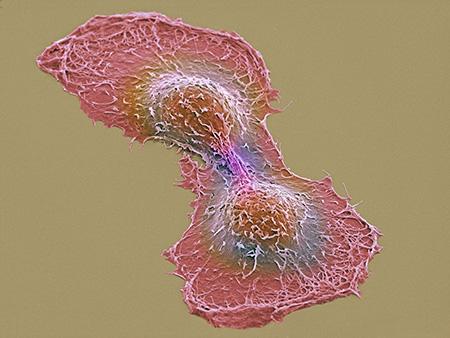A dysfunctional enzyme involved in building cancer cell membranes helps fuel tumor growth; when it’s disabled or depleted in mouse models, tumors shrank significantly

Credit: Image courtesy of Thomas Deerinck, National Center for Microscopy and Imaging Research, UC San Diego.
A research team headed by scientists at University of California San Diego School of Medicine and the Ludwig Institute for Cancer Research at UC San Diego has identified an enzyme involved in remodeling the plasma membrane of multiple cancer cell types that is critical to both survival of tumors and their uncontrolled growth.
The finding, published in the July 11, 2019 issue of Cell Metabolism, suggests a potential target for new drugs.
“Cancers are characterized not only by major changes in their genomes, but also by profound shifts in how they take up and utilize nutrients to propel rapid tumor growth,” said senior author Paul S. Mischel, MD, professor in the UC San Diego School of Medicine Department of Pathology and Ludwig member. “How do these diverse aspects fit together and can they be taken advantage of, for the benefit of patients?”
In the new study, conducted in collaboration with Benjamin Cravatt, PhD, professor at Scripps Research, and led by first author Junfeng Bi, PhD, in Mischel’s lab, researchers identified an enzyme called LPCAT1, whose levels increase in cancer and which plays a key role in tumor growth by changing the phospholipid composition of the cancer cells’ plasma membrane, allowing amplified and mutated growth factor signals to spur tumor growth.
Without LPCAT1, tumors cannot survive. When researchers genetically depleted LPCAT1 in multiple types of cancer in mice, including highly lethal glioblastomas (brain) and an aggressive lung cancer, malignancies shrank dramatically and survival times improved.
The results, wrote the authors, demonstrate that LPCAT1 is an important enzyme that becomes dysregulated in cancer, linking common genetic alterations in tumors with changes in their metabolism to drive aggressive tumor growth.”
“Advances in DNA sequencing technologies have reshaped our understanding of the molecular basis of cancer, suggesting a new and more effective way of treating cancer patients,” said Mischel. “However, to date, precision oncology has yet to benefit many patients, motivating a deeper search into understanding how genetic alterations in tumors change the way cancer cells behave, and potentially unlocking new ways to more effectively treat patients.
“These results also suggest that LPCAT1 may be a very compelling new drug target in a wide variety of cancer types.”
###
Co-authors include: Taka-Aki Ichu and Alex Reed, Skaggs Research; Ciro Zanca, Huijun Yang, Sudhir Chowdhry, Kristen M. Turner, Wenjing Zhang and Sihan Wu, Ludwig Institute for Cancer Research; Wei Zhang, Oswald Quehenberger, Jeremy N. Rich, Webster K. Cavenee and Frank B. Furnari, UC San Diego; Yuchao Gu and Genaro R. Villa, Ludwig and UCLA; Shiro Ikegami, Chiba University; William H. Yong, Harley I. Kornblum, and Timothy F. Cloughesy, UCLA.
Disclosure: Paul Mischel is co-founder of Pretzel Therapeutics. He has equity and serves as a consultant for the company. He also did one-time consultation for Abide Therapeutics.
Media Contact
Scott LaFee
[email protected]
Related Journal Article
http://dx.




